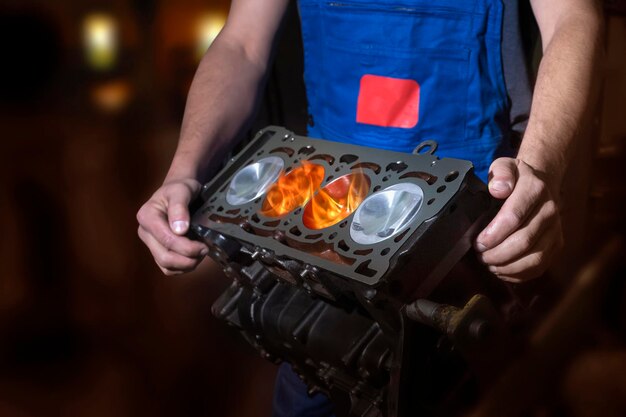
Why Ignoring Small Leaks Can Destroy Your Engine (Especially in German Cars)
It starts out so innocently: a few drops of oil on the driveway, a slight burning smell under the hood, or a tiny puddle of coolant after parking overnight. Many drivers brush it off as “no big deal” and plan to deal with it later. But when it comes to German vehicles like BMW, Audi, Mercedes-Benz, Porsche, and Volkswagen, even the smallest fluid leaks can escalate into serious engine damage—fast.
German cars are precision machines designed for performance and reliability, but they are also engineered with tight tolerances and advanced components that depend heavily on proper lubrication and cooling. A leak, no matter how small, can set off a chain reaction of problems that lead to overheating, premature wear, and even catastrophic engine failure.
In this article, we’ll break down why small leaks are never “just small,” how they impact your car’s performance, and why quick action can save you thousands in repairs.

Why Do German Cars Develop Fluid Leaks?
It’s a common question: “Why do high-end German cars seem more prone to leaks?” While these vehicles are built to exacting standards, there are a few reasons why leaks are a frequent issue:
- High-pressure systems: German engines operate with higher pressures and tighter tolerances than many other vehicles. This allows for better performance but can make seals and gaskets more vulnerable as they age.
- Complex engine designs: Many German models have turbochargers, direct injection, and intricate cooling systems. This complexity introduces more potential leak points.
- Aging seals and gaskets: Over time, heat cycles cause rubber and composite gaskets to shrink, crack, or harden, especially in critical areas like the valve cover or oil filter housing.
Take the Audi valve cover gasket, for example. This gasket sits on top of the engine, sealing the area where oil circulates around the valvetrain. If it deteriorates, oil can seep out onto hot engine components, leading to smoke, odor, and even fire hazards if ignored.
What Happens When You Ignore a Leak?
A little bit of oil or coolant on the garage floor may not seem urgent, but here’s what can happen if you don’t address it promptly:
- Loss of lubrication: Engine oil is the lifeblood of your engine. If you lose enough oil through a leak, components like bearings, camshafts, and turbochargers can suffer from friction and wear. What starts as a simple BMW oil leak repair could turn into a full engine rebuild if ignored.
- Overheating: Coolant leaks reduce your engine’s ability to maintain proper temperatures. German engines are particularly sensitive to overheating, which can warp cylinder heads and cause head gasket failure.
- Contamination: Leaks can allow dirt and debris into sensitive areas. Oil mixed with coolant or brake fluid contaminated with moisture can lead to corrosion and additional system failures.
- Damage to surrounding parts: Oil dripping onto belts, hoses, and sensors can degrade these parts over time. In some cases, leaks lead to serpentine belt slippage or alternator failure.
How Small Leaks Affect Performance
Even before they cause catastrophic failure, fluid leaks can rob your German car of the performance you bought it for. Low oil levels can increase friction and reduce engine efficiency. Coolant leaks can cause your car to run hotter than normal, leading to power loss and reduced fuel economy. Transmission or differential leaks can affect shifting quality and drivetrain stability.
And because German cars rely on advanced electronic systems, even a minor leak can wreak havoc. Oil-soaked sensors may send false readings, causing the car to go into limp mode or triggering the dreaded “check engine” light.
Signs Your Car May Have a Leak
The best way to avoid serious repairs is to catch leaks early. Here are some common warning signs:
- Fluid spots or puddles under the car: Clear, red, green, or brown spots can indicate coolant, oil, transmission fluid, or power steering fluid leaks.
- Burning smell: Oil or coolant dripping onto hot exhaust components can create a distinct burning odor.
- Visible oil around gaskets or seals: Check around the valve cover, oil pan, and timing cover for wetness or sludge buildup.
- Low fluid levels: If you’re topping off oil or coolant more often than usual, a leak is likely the culprit.
- Smoke from the engine bay: Even small leaks can cause visible smoke as fluids burn off.
Why Acting Quickly Matters (Especially for German Cars)
German engines are built with tight tolerances and high-performance components that don’t respond well to low fluid levels. Ignoring a leak in these vehicles is far riskier than in many other brands. What could have been resolved with a simple gasket replacement may snowball into a much larger repair if neglected.
For example, ignoring an oil leak from the oil filter housing in a BMW can lead to loss of lubrication and engine damage. Similarly, failing to address a coolant leak can result in overheating, warped cylinder heads, and blown head gaskets—repairs that can easily cost thousands.
How Leaks Are Diagnosed and Repaired
At German Automotive Performance in Arnold, MD, we take a methodical approach to diagnosing German car fluid leaks. Using advanced diagnostic equipment, we:
- Perform a visual inspection: We look for obvious signs of wetness around gaskets, seals, and hoses.
- Use UV dye and pressure testing: This allows us to trace leaks that may only occur under certain conditions.
- Check fluid levels and condition: This helps identify which system is affected and how severe the leak is.
- Pinpoint the root cause: Whether it’s a failing Audi valve cover gasket, a worn-out oil cooler seal, or a cracked expansion tank, we find the source rather than just treating the symptom.
Once the leak is located, we use OEM-quality parts and premium Liqui Moly fluids to ensure a lasting repair. Our factory-trained technicians have decades of combined experience working on Audi, BMW, Porsche, Mercedes-Benz, and Volkswagen vehicles, so you can trust that the job will be done right the first time.

Preventing Leaks in the First Place
The best way to avoid costly leaks is through consistent maintenance. We recommend:
- Regular oil changes with high-quality oil and filters (at intervals specific to your vehicle).
- Periodic inspections of gaskets, seals, and hoses, especially if your car is over 60,000 miles.
- Coolant system flushes and checks to keep seals from drying out.
- Prompt attention to dashboard warning lights, odors, or fluid loss.
Our team specializes in factory-scheduled maintenance that keeps your German car running smoothly and prevents minor issues from becoming major problems.
Don’t Put Off Repairs
It’s easy to ignore a small leak, especially if the car still seems to run fine. But the reality is that leaks never fix themselves—they only get worse. Addressing a leak early is almost always far less expensive than dealing with the aftermath.
If you’ve noticed fluid spots under your German car, a burning smell, or low fluid levels, now is the time to take action. Our expert team at German Automotive Performance in Arnold, MD, can inspect your vehicle, pinpoint the source of the leak, and perform a high-quality repair using OEM parts and fluids.
We are your dealership alternative, offering the same expert service for Audi, Porsche, BMW, Mercedes-Benz, and Volkswagen vehicles—without the dealership prices. With over 40 years of combined experience and partnerships with brands like Liqui Moly, you can trust us to protect your investment.
Call us today at 443-335-9913 or book your appointment online to stop small leaks before they destroy your engine.
